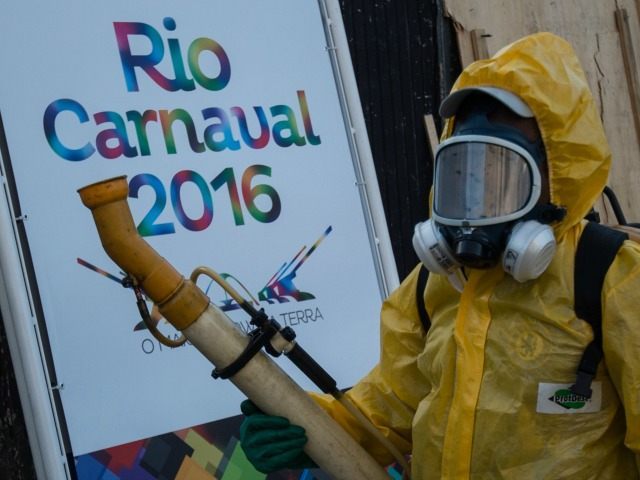Officials in Rio de Janeiro are identifying two cases of Zika virus infection every hour. A report from O Globo highlights the role neglect among Brazilian officials has played in allowing mosquito infestation in many of the nation’s urban hubs.
O Globo reported the government reported 1,499 notifications of the disease in the first 29 days of 2016. Doctors confirmed 64 Zika cases among those. Despite the outbreak, officials have not demanded that hospitals report confirmed Zika cases for tracking. Edimilson Migowski, chief of pediatric infectious diseases at the Federal University of Rio de Janeiro (UFRJ), claims the “records of suspected cases account for only 2% of the total number of infected people, which is close to 75,000.”
Migowski also blamed the city council for the disease because officials have not held an Index Survey on the Aedes aegypti mosquito since last October. These surveys track Aedes aegypti mosquitos, which carry the Zika virus. Silvia Cavalcantti, graduate coordinator in Microbiology UFF [Fluminense Federal University], placed the same complaint.
“Working with a LIRAa [the survey] is something basic,” she explained. “Knowing the most affected areas is essential to promote more intensive actions against epidemics. If the surveys show that an area is at risk, agents can be relocated to minimize the effects.”
She added: “In addition, the work must be done all year. It’s no use fighting the vector seasonally.”
In 2014, the World Health Organization (WHO) warned dengue and chikungunya, diseases spread by the same mosquitos, would dominate in 2015. Last January, doctors attempting to diagnose these diseases recorded patients experiencing low-grade fevers and joint pain, which do not fit the symptoms of those diseases. They urged the government not to classify the cases as dengue.
“But the authorities were slow to believe,” said Carlos Brite, a doctor in Recife, the epicenter of Zika.
Officials finally acknowledged Zika in May. Claudio Maierovitch, director of the health ministry’s Department of Communicable Disease Surveillance, insisted they received the warnings “too early” and science showed them that Zika only causes mild fevers without major complications. It took them another six months to link the disease to microcephaly, which causes infants to develop skulls too small for their brains.
Gubio Soares, a virologist at the Federal University of Bahia in Brazil, discovered some of the earliest cases of Zika in April 2015. He recently told reporters he never received funding for research and the government never reached out to him.
“I have no funding for Zika,” he said. “I’ve never been invited by any official to develop a research project.”
O Globo also reported the Ministry of Health “stressed” that officials continue to gather information about Aedes aegypti, but residents in poor cities like Rocinha and affluent neighborhoods like Alto Leblon have noticed standing water and neglect from state workers.
“In the last two years, no one from the city has done mosquito surveys,” said Ednaldo, who has worked in the neighborhood for 27 years. “The agents arrive with a piece of paper, sign it, and then do nothing. Previously they put larvicidal powder into the drains and saucers of plants. But there are more. If you do a survey on the street, you will find many mosquito breeding grounds.”
Ednaldo also criticized the residents in the neighborhood.
“Dwellers in my building let water accumulate in saucers,” he exclaimed. “People here are the type who ask to save water, but also allow a child to play two hours outside with the hose. It is carelessness.”
Community organizer José Martins has not witnessed any inspections from state workers in Rocinha.
“For decades we have been advocating for improvements in sanitation as the number one priority for public investments here while the government has insisted on flashier interventions that do not save money on healthcare costs down the line,” he vented. “Street carnival parades pass through here as well. People live here where there is already a higher instance of tuberculosis and other diseases.”
The National Institutes of Health confirmed that the Zika virus outbreak has reached pandemic levels in Latin America.
“You have multiple countries in South America and in the Caribbean, so by anybody’s definition that would be considered a pandemic,” explained Dr. Anthony Fauci, head of the infectious diseases branch at the institute.

COMMENTS
Please let us know if you're having issues with commenting.